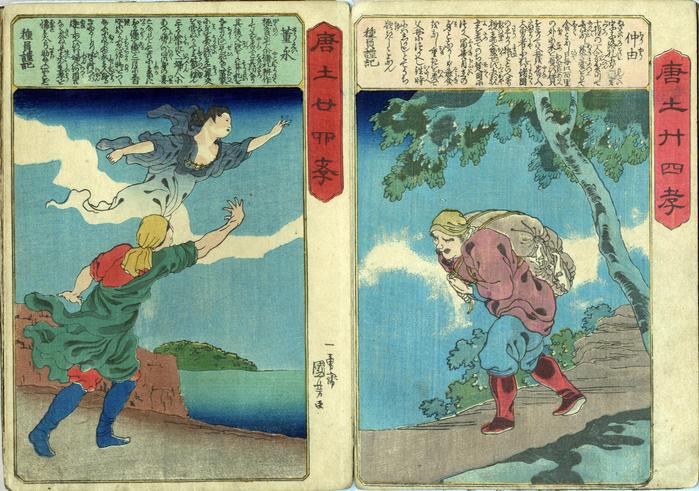Utagawa Kuniyoshi (歌川国芳) (artist 11/15/1797 – 03/05/1861)
Tō Ei (Dong Yong 董永) on the left and Chū Yū (Jung Yō 仲由) on the right, from the series The Twenty-four Chinese Paragons of Filial Piety (Morokoshi nijūshi-kō - 唐土廾四孝)
1848
13.5 in x 9.5 in (Overall dimensions) color woodblock print
Signed: Ichiyūsai Kuniyoshi ga
一勇斎国芳画
Inscription; Ryūkatei Tanekazu
Museum of Fine Arts, Boston - left panel
Museum of Fine Arts, Boston - right panel
Museum für angewandte Kunst, Vienna - right panel
Museum für angewandte Kunst, Vienna - left panel
Tokyo Metropolitan Library - right panel
Tokyo Metropolitan Library - left panel
Musées Royaux d'Art et d'Histoire (via Ritsumeikan University) - right panel only - trimmed
Musées Royaux d'Art et d'Histoire (via Ritsumeikan University) - left panel only - trimmed
Art Institute of Chicago - right panel
Art Institute of Chicago - left panel
Nationaal Museum van Wereldculturen (Rijksmuseum Volkenkunde, Leiden) via Ritsumeikan University - left panel only
Allen Memorial Art Museum, Oberlin College - right-hand panel only Below is R. Keller Kimbrough's translation of an early edition of the Nijūshikō. It does not specifically apply to these Kuniyoshi prints except in the most general terms.
[12] Tō Ei 董永 (Dong Yong)
He borrows coins to bury his father,Tō Ei was separated from his mother when he was young. His family was poor, and he passed his days working for others, farming to earn wages. Because his father was crippled and could not stand, Tō Ei built a small cart, set his father on it, and parked it on the ridges between rice paddies so that he could tend to him there. The time came when his father died. Tō Ei wanted to arrange a funeral service, but because he had always been poor, he could not. Thus, he sold himself for a payment of ten kan, and he held the funeral rites. Later, when he set out for the master’s house, he encountered a beautiful woman on the road. Saying that she would be his wife, she went with him, and in a single month she wove three hundred bolts of tight silk. When she presented it to the master, he was so moved that he set Tō Ei free. After that, the woman said to Tō Ei, “I am a celestial weaver-woman. The Emperor of Heaven was moved by your filial piety, and he sent me here to repay your debt.” With that, she rose up into the sky.
and a heavenly maiden meets him on the road.
She weaves silk to repay the lender.
Moved by his filial piety, everyone knows his name.
****
The text below was composed by Ryūkatei Tanekazu (柳下亭種員: 1807-58).
The text of the right panel reads: 仲由(ちうゆう) 字(あざなは)子路(しろ)孔子(こうし)が門弟(もんてい)十哲(じつてつ)の一人家(いへ)貧(ひん)にして産(なりはひ)なし藜(あかざ)?(まめのは)をもて食(しよく)となし日毎(ひごと)に百里の外(ほか)に米(こめ)を負行(おひゆき)賃(あたへ)をとりて父母を養(やしな)ふ大勇者(たいゆうしや)なれば諸国(しょこく)の王(わう)より招(まね)くといへとも親(おや)在(います)ゆへ應(おう)ぜず両親(ふたおや)世(よ)を去(さつ)てのち楚國(そこく)につかへ冨貴自在(ふうきじざい)の身(み)となりしが麁食(そじき)をなし重(おも)きを負(おふ)て父母につかへし往時(いにしへ)にはしかじとてうち歎(なげ)きしとなん 種員謹記
The book entitled The Twenty-four Paragons of Filial Piety was written by the Chinese scholar Guo Jujing during the Yuan Dynasty. His pen name was Yizi, and he is known in Japan as Kaku Kyokei. The book recounts the self-sacrificing behavior of twenty-four sons and daughters who go to extreme lengths to honor their parents, stepparents, grandparents, and in-laws. Many of the images in this series appear Western in style, rather than Japanese, and were probably copied from Italian prints. The prints in this edition appear to have been printed two per ōban sheet (about 9.5 x 13.5 inches) and folded to chūban pages (about 9.5 x 6.75 inches). The were once bound together in an album.
"Japanese name: Tōyei
Chinese name: Tung Yung
Tōyei indentured himself to a weaver in order to raise money for his father’s burial. One day he met a woman who, in the first hour after their marriage, wove enough silk to fulfill the terms of his contract and then revealed herself to be the Heavenly Weaver (Shokujo) before ascending to heaven.
Robinson: S60.12" (This information was taken directly from the Kuniyoshi Project.)
Japanese name: Chūyū
Chinese name: Chung Yu
Chûyû carrying bags of ice on his back for his parents
Robinson: S60.20
[The above English-language information is all taken directly from the Kuniyoshi Project.]
The text on the left panel reads: 菫永(とうえい) 極貧(ごくひん)にて人に傭(やとは)れ耕作(かうさく)して父を養(やしな)ふこと甚切(はなはだせつ)なり其後父没(ぼつ)せしに葬礼(そうれい)をなす力(ちから)なし是非(ぜひ)なく冨家(とむいへ)に身(み)を賣(うり)銭(ぜに)をえて葬(そう)交を営(いとなみ)ぬかくて主(しゆう)の家(いへ)へ往(ゆか)んとする途中(みち)にて一婦人(いつふしん)にあへり婦人(ふじん)の曰(いはく)御身の妻(つま)とならんとて共に主(しゆう)家に至(いた)り?(かどり)を織(おる)こと一月に三百匹(ひき)におよぶ忽(たちまち)借(かり)し物(もの)をつくなふに及(およ)ぶゆゑ主人(しゆじん)驚(おどろ)きゆるしけり帰(かへ)る時以前(いぜん)逢(あひ)し所へ行ば婦人(ふじん)何国(いつく)共なく?(さり)ぬ是永(えい)が至孝(しいかう)を憐(あはれ)み天より助(たすけ)給ふ所とぞ 種員謹記
****
Illustrated: There is a full-page, colored reproduction of the print on the left in Ukiyoe Museums in Japan (Nihon no ukiyoe bijutsukan - 日本の浮世絵美術館), vol. 1, p. 47. This example is from the collection of the Tōhoku University Library (東北大学附属図書館).
Historical - Social - Ephemera (genre)
Fushimiya Zenroku (伏見屋善六) (publisher)
Ryūkatei Tanekazu (柳下亭種員 - 1807-58) (author)
Nijūshikō (二十四孝: The twenty-four filial exemplars) (genre)
